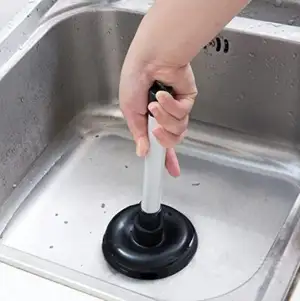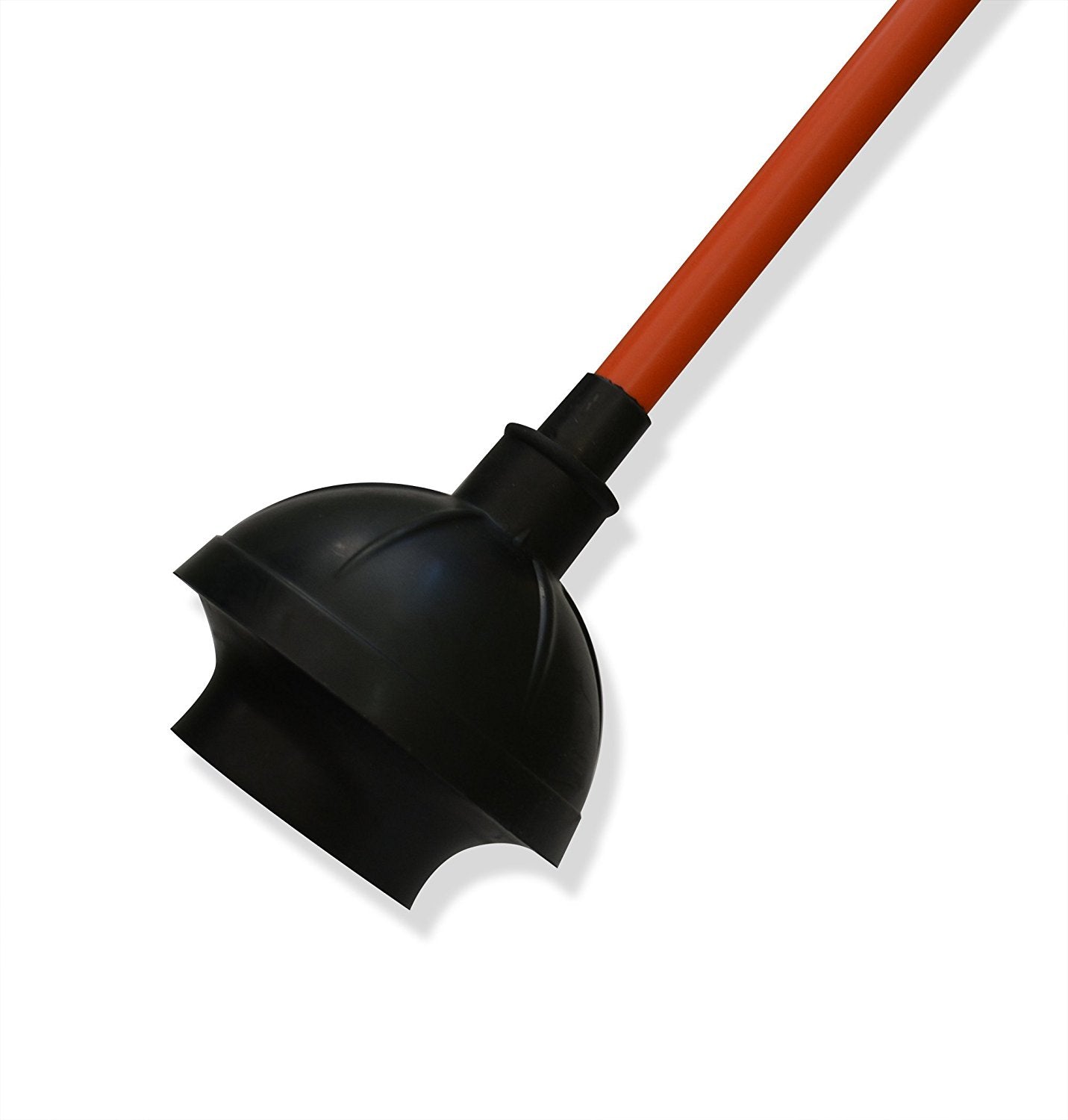Improving Plungers and Drain Cleaner: Pro Methods
Improving Plungers and Drain Cleaner: Pro Methods
Blog Article
The content underneath relating to How to Use a Plunger to Unclog a Toilet or Drain is absolutely captivating. Read it for yourself and figure out what you think about it.

Intro
Appropriate maintenance of family drains pipes is crucial for avoiding clogs and guaranteeing smooth water circulation. Among the trick devices in every property owner's toolkit is the bettor, along with different drainpipe cleansers designed to tackle stubborn blockages properly. This write-up explores how to use plungers and drain cleansers effectively to maintain your drains pipes moving easily.
Area 1: Comprehending Plungers
Types of Plungers
There are several sorts of bettors offered, each developed for different sorts of drains pipes and clogs. One of the most typical types include cup plungers, flange plungers, and accordion bettors.
Just How Plungers Job
Bettors service the concept of developing stress and suction to displace obstructions. When properly used over a drain, they produce a vacuum that can pull out debris or break up blockages.
Choosing the Right Plunger
Selecting the right bettor relies on the sort of drainpipe and the nature of the blockage. Cup plungers are ideal for sinks and bathtubs, while flange bettors are better suited for toilets as a result of their style.
Usual Errors with Bettors
Preventing these blunders guarantees efficient plunging: improper seal around the drain, inadequate force, and not clearing bordering debris.
Section 2: Utilizing Plungers Properly
Prep work
Prior to diving, make sure the plunger covers the drain completely and forms a limited seal. Clear any type of visible debris around the drainpipe opening.
Method
Start with mild diving motions to construct suction. Boost pressure progressively, utilizing a stable rhythm. Repeat as necessary up until the drain removes.
Troubleshooting Tips
If diving doesn't function, try changing the seal, applying petroleum jelly for a better seal, or using a different sort of bettor.
Section 3: Understanding Drainpipe Cleansers
Kinds Of Drain Cleansers
Drain pipes cleansers can be chemical or chemical. Chemical cleansers make use of solid chemicals to liquify blockages, while enzymatic cleaners use all-natural enzymes to break down raw material.
Just How Drainpipe Cleansers Work
Chemical cleansers respond with blockages to dissolve them, while chemical cleansers break down organic materials like hair and oil without hurting pipelines.
Safety and security Considerations
Always wear handwear covers and eye defense when using chemical drain cleaners. Make certain adequate air flow and follow supplier directions meticulously.
Eco-Friendly Alternatives
Consider making use of vinegar and cooking soda or enzyme-based cleansers for green choices that are safer for pipelines and the environment.
Area 4: Using Drainpipe Cleaners Properly
Application Techniques
Put chemical cleaners directly right into the drain opening. Enable them to benefit the recommended time prior to purging with hot water. Enzymatic cleansers need to sit overnight.
Preventative measures
Avoid mixing different kinds of cleansers, as this can generate toxic fumes. Never utilize chemical cleansers together with a plunger, as spilling can occur.
Handling Persistent Obstructions
For relentless clogs, take into consideration making use of a pipes snake or calling a professional plumbing to prevent damages to pipelines.
Final thought
In conclusion, recognizing exactly how to utilize bettors and drainpipe cleaners properly is crucial for preserving healthy pipes systems. By selecting the right tools and techniques, home owners can tackle minor clogs and avoid major pipes issues down the line.
How To Properly Use A Plumbing Snake To Clear Drains
When any drain clogs in our home arise, we tend to gravitate toward the plunger and little else. In cases where the plunger and its vacuum-created pressure are not able to clear clogs, many immediately move to harmful chemicals or simply call their plumber to fix the issue.
we’re happy to help with all drain cleaning needs and concerns. This includes informing you on a few other home remedies you may have at your disposal for minor to moderate clogs, one of which is the use of a plumbing snake. Many people have never used one of these before – let’s go over the steps to take when your drain clogs and you have a plumbing snake available.
Attempt Plunger Use
The first step here, as we noted above, should indeed be to grab your plunger when you notice a drain clog and attempt to resolve it this way. If you’re unsure how to use a particular type of plunger, our plumbers can answer any questions you have. If this doesn’t do the trick, however, you move on to the snake.
Locate And Prepare Snake
A plumbing snake is a metal or plastic device that’s generally about a quarter of an inch thick. It’s design with significant extensions, meant to reach down into your clogged drain and push the clog out. Snakes also contain drain augers that will latch onto and push stubborn blockages.
If your plunger doesn’t clear a clog, locate your snake and bring it to the drain in question. We also recommend keeping a bucket nearby to collect the clog once you pull it out, plus we’d advise wearing goggles and possibly protective gloves.
Feed Snake
Once you’re ready to go, feed the snake slowly down the drain, using the crank device it comes with to keep it moving until it finds the clog. Once this happens, much of the clog will be latched onto the coil so you can pull it out, while the rest will simply break up and flow downward.
Detach Debris
Remove the snake slowly from the drain, and once you’ve done so, pick off any debris that’s stuck to the coil. This is another area where wearing gloves is a must.
Flush Drain
Finally, take a few minutes to ensure the snake has done its job correctly. If you’ve been using it on a toilet, flush the toilet a couple times and make sure everything flows well. If you’ve used it on a different drain, flush it with some room temperature water.
https://www.mybuddytheplumber.com/blog/how-to-properly-use-a-plumbing-snake-to-clear-drains/

Application Techniques
Put chemical cleaners directly right into the drain opening. Enable them to benefit the recommended time prior to purging with hot water. Enzymatic cleansers need to sit overnight.
Preventative measures
Avoid mixing different kinds of cleansers, as this can generate toxic fumes. Never utilize chemical cleansers together with a plunger, as spilling can occur.
Handling Persistent Obstructions
For relentless clogs, take into consideration making use of a pipes snake or calling a professional plumbing to prevent damages to pipelines.
Final thought
In conclusion, recognizing exactly how to utilize bettors and drainpipe cleaners properly is crucial for preserving healthy pipes systems. By selecting the right tools and techniques, home owners can tackle minor clogs and avoid major pipes issues down the line.
How To Properly Use A Plumbing Snake To Clear Drains
When any drain clogs in our home arise, we tend to gravitate toward the plunger and little else. In cases where the plunger and its vacuum-created pressure are not able to clear clogs, many immediately move to harmful chemicals or simply call their plumber to fix the issue.
we’re happy to help with all drain cleaning needs and concerns. This includes informing you on a few other home remedies you may have at your disposal for minor to moderate clogs, one of which is the use of a plumbing snake. Many people have never used one of these before – let’s go over the steps to take when your drain clogs and you have a plumbing snake available.
Attempt Plunger Use
The first step here, as we noted above, should indeed be to grab your plunger when you notice a drain clog and attempt to resolve it this way. If you’re unsure how to use a particular type of plunger, our plumbers can answer any questions you have. If this doesn’t do the trick, however, you move on to the snake.
Locate And Prepare Snake
A plumbing snake is a metal or plastic device that’s generally about a quarter of an inch thick. It’s design with significant extensions, meant to reach down into your clogged drain and push the clog out. Snakes also contain drain augers that will latch onto and push stubborn blockages.
If your plunger doesn’t clear a clog, locate your snake and bring it to the drain in question. We also recommend keeping a bucket nearby to collect the clog once you pull it out, plus we’d advise wearing goggles and possibly protective gloves.
Feed Snake
Once you’re ready to go, feed the snake slowly down the drain, using the crank device it comes with to keep it moving until it finds the clog. Once this happens, much of the clog will be latched onto the coil so you can pull it out, while the rest will simply break up and flow downward.
Detach Debris
Remove the snake slowly from the drain, and once you’ve done so, pick off any debris that’s stuck to the coil. This is another area where wearing gloves is a must.
Flush Drain
Finally, take a few minutes to ensure the snake has done its job correctly. If you’ve been using it on a toilet, flush the toilet a couple times and make sure everything flows well. If you’ve used it on a different drain, flush it with some room temperature water.
https://www.mybuddytheplumber.com/blog/how-to-properly-use-a-plumbing-snake-to-clear-drains/

I ran across that content on Here's How to Correctly Use a Toilet Plunger while doing a search on the internet. Enjoyed our piece of writing? Please share it. Let somebody else check it out. Many thanks for taking the time to read it.
Appointment Report this page